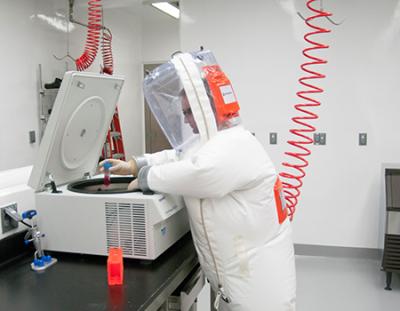
Virologist Kyle Rosenke, Ph.D., using a centrifuge inside a BSL-4 suite at the Rocky Mountain Laboratories Integrated Research Facility. A centrifuge rotor tool is in the foreground.
NIAID supports research and early development of medical countermeasures against terrorist threats from infectious diseases, radiation exposure and chemical threats to the civilian population.
Why Are Biodefense And Related Programs a Priority for NIAID?
After the events of September 11, 2001, and the subsequent anthrax mailings, biodefense became an important element of the NIAID mission. In 2003, NIAID was assigned lead responsibility within the U.S. Department of Health and Human Services (HHS) and the National Institutes of Health (NIH) for civilian biodefense research with a focus on research and early development of medical countermeasures against terrorist threats from infectious diseases and radiation exposure. NIAID later assumed responsibility for coordinating the NIH‐wide effort to develop medical countermeasures against chemical threats to the civilian population.
How Is NIAID Addressing This Critical Topic?
NIAID supports research and early development of medical countermeasures against terrorist threats from infectious diseases, radiation exposure and chemical threats to the civilian population. Because new potentially deadly pathogens, such as avian influenza, may be naturally occurring as well as deliberately introduced by terrorists, NIAID’s biodefense research is integrated into its larger emerging and re‐emerging infectious diseases portfolio. While NIAID continues to focus on developing drugs, vaccines, and diagnostics for these disease agents, the research focus has evolved from the traditional “one bug–one drug” approach to a more flexible strategy using sophisticated genomic and proteomic platforms focused on developing broad‐spectrum therapies effective against entire classes of pathogens.
News Releases
- NIH-Sponsored Trial of Lassa Vaccine Opens
March 17, 2025 - NIH-Funded Clinical Trial Will Evaluate New Dengue Therapeutic
February 11, 2025
NIAID Now Blog
Funded Research News
- Updated Hep B Vaccine More Effective for People with HIV
December 11, 2024

